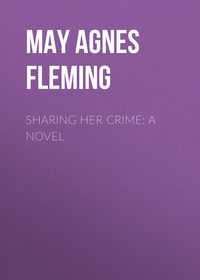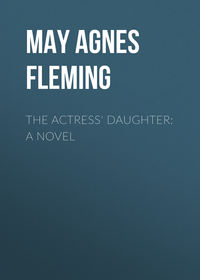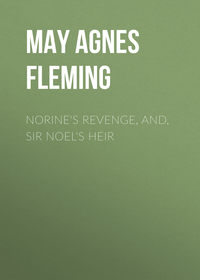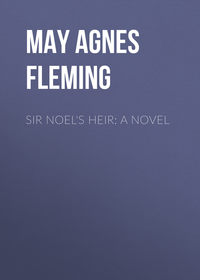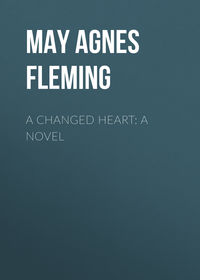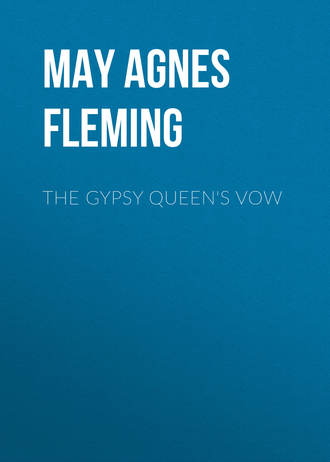 полная версия
полная версияThe Gypsy Queen's Vow
“Maude, Maude! My bride, my life, my peerless darling! Oh, Maude, this is too much happiness!” he cried, in a sort of transport between the passionate kisses pressed on her warm, yielding lips.
Blushingly she rose from his embrace, and gently extricated herself from his arms.
“Oh, Maude, my beautiful darling! May Heaven forever bless you for this!” he fervently exclaimed, all aglow with passionate love.
She had sunk into a seat, and bent her head into her hand, not daring to meet the full, falcon gaze, flashing with deepest tenderness, that she knew was bent upon her.
“Speak again, Maude! Once more let me hear those precious words from your own sweet lips, Maude! Maude, sweetest and fairest, speak!”
He wreathed his arms around her, while he seemed breathing out his very soul as he aspirated her name.
“But you have not heard all, my lord. This secret – do you not wish to hear it?” she faintly said, without lifting her dark, beautiful eyes.
“Not unless it is your wish to tell it. I want to hear nothing but that you are my own.”
“Yet, when you hear it, my lord, you may reject the hand I have offered.”
“Never, never! Nothing under heaven could make me do that!”
“You speak rashly, Lord Ernest. Wait until you have heard all. I dare not accept the noble heart and hand you offer, without revealing the one great error of my youth.”
“You commit error, my beautiful saint? You, who are as perfect in soul as in body. Oh, Maude, I cannot believe it.”
“It is true, nevertheless, my lord. But oh, how shall I tell you? How can I confess what I have been – what I am?”
There was a sharp agony in her voice, and her head dropped on her hands, and her fair bosom rose and fell like a tempest-tossed sea.
Encircling her with his arm, he drew her down until her white face lay hidden in his breast, and then pressing his lips to the dark ripples of hair sweeping against his cheek, he murmured, in tenderest whisper:
“Tell me now, Maude, and fear not; for nothing you can say will convince me you are not as pure and unsullied as the angels themselves. What is this terrible secret, sweetest love?”
“Oh, my dear lord, every word you speak, every caress you give me, makes my revelation the harder!” she passionately cried. “And yet it must be made, even though you should spurn me from you in loathing after. Listen, my lord. You think me Lady Maude Percy?”
“Yes, dear love.”
“That is not my name!”
“What, Maude?”
“That is not my name. No; I am not mad, Lord Villiers, though you look as if you thought so. I have been mad once! You and all the world are deceived. I am not what I seem.”
“What, in Heaven’s name do you mean? What then are you?”
“I was a wife! I have been a mother! I am a widow!”
“Maude!”
“You recoil from me in horror! I knew it would be so. I deserve it – I deserve it! but oh, Lord Villiers, it will kill me!” she cried, passionately wringing her hands.
“Maude, are you mad?”
“I am not – oh, I am not! if a grief-crazed brain, a blighted life, a broken heart be not madness.”
“But, Maude! Good heavens! You are so young – not yet eighteen! Oh, it cannot be true!” he cried, incoherently.
“Would to God it were not! Yet four years ago I was a wedded wife!”
“Wife, mother, and widow at eighteen! Maude, Maude, how can I realize this?”
“Oh, I was crazed! I was mad! and I did love him so, then! Not as I love you, Lord Ernest, with a woman’s strong, undying affection, but with the wild, passionate fervor of youth. I must have inherited my dead mother’s Spanish blood; for no calm-pulsed English girl ever felt love like that.”
“Oh, Lady Maude! – Lady Maude! I could hardly have believed a messenger from heaven had he told me this.”
“God be merciful to human error! A long life of sorrow and remorse must atone for that first rash fault.”
He was pacing up and down the long room with rapid, excited strides; his fine face flushed, and his hands tightly shut, as if to keep down the bitterness that rebelliously rose at this unlooked-for avowal. He had expected to hear some light, trivial fault, magnified by a morbid imagination; but not a clandestine marriage. No man likes to hear that the woman he loves has ever loved another; and Lady Maud Percy had already seemed so angelic that this sudden “falling off” of his high ideal, brought with it a pang like the bitterness of death.
And therefore, pacing up and down – up and down, with brain and heart in a tumult – Lord Ernest Villiers’ pride for one moment overcame and mastered his love. For one brief moment only – for then his eyes fell on the drooping figure and despair-bowed young head; and the anguished attitude went to his heart, bringing back a full tide of pity, love, and forgiveness. All was forgotten, but that she was the only one he ever did or could love; and lifting the sorrowing head and grief-bowed form in his arms, once more he clasped her closer to the manly young heart she could feel throbbing under her own, and whispered:
“My own life’s darling still! Oh, Maude! if you must grieve, it shall be on my breast. If you have erred, so, too, have I – so have we all often. I will forget all but that you have promised my arms shall be your home forever!”
“And you forgive and love me still? Oh, Lord Ernest!” He kissed away her tears as she wept aloud.
“One thing more, dearest. Who was my Maude’s first love!”
He felt a convulsive shiver run through the delicate form he held. He felt her breast heave and throb as if the name was struggling to leave it, and could not.
“Tell me, Maude, for I must know.”
“Oh, saints in heaven! how can I? Oh, Lord Ernest! this humiliation is more than I can endure.”
“Speak, Lady Maude! for I must know.”
She lifted her eyes to his, full of unspeakable anguish, and then dropped her head heavily again; for in that fixed, grave, noble face, full of love and pity as it was, there was no yielding now.
“Tell me, Maude, who was the husband of your childhood?”
From the pale, quivering lip, in a dying whisper, dropped the words: “Reginald Germaine, the gipsy!”
There was a moment’s death-like silence. The handsome face of Lord Ernest Villiers seemed turned to marble, and still motionless as if expiring, she lay in the arms that clasped her still in a close embrace. At last:
“Heaven be merciful to the dead! Look up, my precious Maude; for nothing on earth shall ever come between us more!”
Calm and clear, on the troubled wave of her tempest-tossed soul, the low words fell; but only her deep, convulsive sobs were his answer.
“Maude! – my own dear Maude!” he cried, at last, alarmed by her passion of grief, “cease this wild weeping. Forget the troubled past, dear love; for there are many happy days in store for us yet.”
But still she wept on – wildly, vehemently, at first – until her strong passion of grief had passed away. He let her sob on in quiet now, with no attempt to check her grief, except by his silent caresses.
She lifted her head and looked up, at last, thanking him by a radiant look, and the soft, thrilling clasp of her white arms.
“I will not ask you to explain now, sweet Maude,” he softly whispered. “Some other time, when you are more composed, you shall tell me all.”
“No – no; better now – far better now; and then, while life lasts, neither you nor I, Ernest, will ever breathe one word of the dark sorrowful story again. Oh, Ernest! can all the fondest love of a lifetime suffice to repay you for the forgiveness you have shown me to-day?”
“I am more than repaid now, dear love. Speak of that no more. But now that the worst is over, will my Maude tell me all?”
“I have not much to tell, Ernest; but you shall hear it. Nearly three years before you and I met, when a child of fourteen, I was on a visit to my uncle Everly’s. My cousin Hubert, home from college, brought with him a fellow-student to spend the vacation, who was presented to me as Count Germaine. What Reginald Germaine was then, you, who have seen him, do not need to know. Handsome, dashing, fascinating, he took every heart by storm, winning love by his gay, careless generosity, and respect by his talents and well-known daring. I was a dreamy, romantic school-girl; and in this bold, reckless boy, handsome as an angel, I saw the living embodiment of my most glorious ideal. From morning till night we were together; and, Ernest, can you understand that wild dream? How I loved him then, words are weak to express, how I loathed and despised him after no words can ever tell. Ernest, he persuaded me to elope with him one night; and we were married. I never stopped to think of the consequences then. I only knew I would have given up my hopes of heaven for him! Three weeks longer he remained at Everly Hall; and then papa sent me back to school, and he went to London.
“No one was in our secret, and we met frequently, unsuspected; though papa, thinking he was too presuming, had forbidden me to associate with him. One day we went out driving; the carriage was upset; I fainted; and for a long time I remembered nothing more.
“When reason returned, I was in a little cottage, nursed by an old woman; while he hovered by my bedside night and day. Then I learned that I had given birth to a child – dead now and buried. I could recollect myself as people recollect things in a confused dream – of hearing for a time the feeble cries of an infant, and seeing a baby face, with the large, black, beautiful eyes of Reginald Germaine. I turned my face to the wall and wept, at first, in childish grief; but he caressed and soothed me, and I soon grew calm. I thought, at the time, a strange, unaccountable change had come over him; though I could not tell what. When I was well again I learned. Standing before me, one morning, he calmly and quietly told me how he had deceived me – that, instead of being a French count, he was the son of a strolling gipsy; but that, having repented of what he had done, he was willing to give me up.
“The very life seemed stricken out of my heart as I listened. Then my pride – the aroused pride of my race – arose; and, oh! words are weak to tell how I loathed myself and him. That I, a Percy – the daughter of a race that had mated with royalty hitherto – had fallen so low as to wed a gipsy! I shrunk, in horror unspeakable, from the black, bottomless quagmire into which I had sunk. All my love in that instant turned to bitterest scorn, and I passionately bade him leave me, and never dare to come near me again, or breathe a word of the past. He obeyed; and from that day I never beheld him more.
“After that, I met you, Lord Ernest, and I loved you as I never loved him. For him, I cherished a blind, mad passion; for you, I felt the strong, earnest love of womanhood. You loved me; but I shrunk from the affection my very soul was crying out for, knowing I dared not love you without guilt. Now you know the secret of my coldness and mysterious melancholy.
“I heard often of Germaine; and his name was like a spear-thrust to my heart. When I was told of his arrest, trial and condemnation for grand larceny, you perhaps may imagine, but I can never tell, exactly what I felt. His name was the theme of every tongue; and day after day I was forced to listen to the agonizing details, knowing – low as he had fallen, guilty as he might be – he was my husband still. Thank God! through all his ignominy, he had honor enough never to reveal our dark secret. Then came the news of his death; and Heaven forgive me if my heart bounded as I heard it!
“Oh, Lord Ernest! you were my first thought. I felt I could dare to love you now as you deserved to be loved, without sinning. I determined to tell you all, and to love you still, even though you spurned me from you forever. Oh, Ernest! my noble-hearted! may God forever bless you for forgiving me as you have done, and loving me still!”
Her voice ceased, but the dark, eloquent eyes were full of untold love – of love that could never die for all time.
“My own! – my own! never so well beloved as now! My Maude! – my bride! – my wife! blot out from the leaves of your life that dark page – that year of passion, of error, of sorrow and shame. We will never speak or think of it more, sweet Maude. Germaine has gone to answer for what he has done; if he has sinned while living, so also he has deeply suffered and sorrow-atoned for all. Fiery, passionate and impulsive, if he has wronged others, so also has he been deeply wronged. May God forgive him!”
“Amen,” was the solemn response.
“And now, Maude, what need of further delay? When shall this dear hand be mine?”
“Whenever you claim it, dear Ernest. I shall have no will but yours now,” she answered, with all a woman’s devotion in her deep eyes, “I am yours – yours through life, and beyond death, if I may.”
CHAPTER X.
THE VOICE OF COMING DOOM
“They spake not a word.But like dumb statues or breathless stones,Stared on each other and looked deadly pale.”Shakspeare.“Oh! positively, your ladyship is looking perfectly dazzling! I never, no, never saw anybody half so beautiful in my life! Oh, Lady Kate! isn’t she charming?” And little Miss Clara Jernyngham, in an outburst of enthusiasm, earnestly clasped her little white hands, flashing with jewels, together, and went off into a look of ecstasy wonderful to behold.
Lady Kate McGregor, the proud, dark-eyed daughter of an impoverished Scottish nobleman, smiled quietly as she replied:
“Lady Maude is always lovely, and like all brides, looks doubly so now. How many of the gentlemen will envy Lord Villiers to-night!”
“Yes, indeed!” exclaimed Miss Clara, earnestly. “I am quite sure if I was a man (which, thank the gods! I am not), I would be tempted to shoot him, or do something else equally dreadful, for carrying off the reigning belle! I really don’t see how any man in his proper senses could help falling in love with Maude. And yet there’s brother George, now, he takes it as coolly as – as – I don’t know what.” The usual fate of Miss Clara’s similes.
Had Miss Jernyngham’s eyes not been so earnestly fixed on a certain superb set of diamonds that lay on a dressing-table near, she might have seen a sudden flush in the dark, handsome face of Lady Kate as she spoke, and that the lace on her bosom fluttered perceptibly, as if with the beating of the heart beneath.
“So Captain Jernyngham does not care?” said Lady Kate, in a voice not quite steady.
“No,” answered Miss Clara, her eyes dancing from the blinding river of diamond-light on the table to a magnificent bridal veil lying near – “no; which is a horrid proof of his insensibility. The fact is, George never was in love in his life, and never will be, so far as I can see. He will, most likely, die an old bachelor, if some rich heiress does not take pity on him, marry him, and pay his debts, before long. Did you see the Duke of B – this evening, though, Lady Kate? What a dear old creature it is! Going about shaking so, like a lot of blanc mange. I’m going to marry him some day, for the family diamonds. Worth while, eh?”
“Miss Jernyngham is herself the best judge of that,” coldly replied Lady Kate, her handsome face growing proud and pale, as she listened to Miss Clara’s speech about her brother.
“Really, Lady Maude, it’s my duty to tell you you are looking perfectly bewildering to-night, as all brides should look. If Lord Villiers had never been in love with you before, he must certainly have fallen into that melancholy predicament this evening,” said little Miss Clara, dancing off on a new tack. “This orange wreath and bridal veil are vastly becoming. I am sure no one would think you had been ill this morning, to look at you now.”
It was a pleasant scene on which the light of the rose-shaded chandelier fell. The superbly-furnished dressing-room of Lady Maude Percy was all ablaze with numberless little jets of flame, which the immense mirrors magnified four-fold. Priceless jewels lay carelessly strewn about on the inlaid dressing-table, mingling with rare bouquets, laces, gloves, and tiny satin slippers, that would scarcely have fitted Cinderella herself. Lady Kate McGregor, proud and stately, in white satin, and point-lace, and pale, delicate pearls, stood leaning against the marble mantel, her handsome eyes growing cold and scornful whenever they rested on Miss Clara Jernyngham. That frivolous little lady, quite bewildering in the same snowy robes, was all unconscious of those icy glances, as she fluttered, like a butterfly over a rose, around another lady standing before a full-length mirror, while her maid arranged the mist-like bridal veil on her head, and set the orange wreath on her dark, shining curls.
It was Lady Maude Percy; and this was her bridal eve. Peerlessly lovely she looked as she stood there, with the light of a happy heart flushing her rounded cheeks, swelling her white bosom, and flashing from her dark, Syrian eyes. The bridal dress she wore was worth a duke’s ransom. It fell around her like a summer cloud, three glistening folds of richest lace, so light, so gauzy, so brilliant, that it looked like a flashing mist. Diamonds that blinded the eyes with their insufferable light rose and fell on her white bosom with every tumultuous throb of the heart beneath. Like a floating cloud fell over all the bridal veil, and glittering above it rose the orange wreath of rarest jewels. There was a streaming light in her magnificent eyes, a living, glowing flush on her cheek, all unusual there; and little Miss Clara stood up and clasped her hands as she gazed in speechless admiration.
It was one month after the interview recorded in the last chapter. Lord Villiers, with a lover’s impatience, would consent to wait no longer; and as Lady Maude had not opposed him, this day had been fixed. The marriage was to have taken place at St. George’s, in the morning; but early that eventful day the bride had been seized with so severe a headache that she was unable to leave her room. Therefore, the ceremony had been necessarily delayed until the evening, when the august bishop of C – himself was to come and perform the nuptial rite at the Percy mansion. Some were inclined to look upon this interruption in the light of an evil omen; but Lady Maude only smiled, and inwardly thought that, as his bride, nothing on earth could ever darken her life more. How little did she dream of the bitter cup of sorrow she was destined yet to drain to the dregs! How little did she dream of the dark, scathing, unresting revenge that hovered around her like a vulture waiting for its prey!
The old earl, her father, who was somewhat old-fashioned in his notions, and liked ancient customs kept up, had determined his daughter’s bridal should be celebrated by the grandest ball of the season.
“I don’t like this new-fangled way young people nowadays have, of getting married in the morning, coming home for a hasty breakfast, and then tearing off, post-haste, for France, or Germany, or somewhere, as if they wanted change of scene to reconcile them to what they have done,” said the old gentleman, in strict confidence, to Lord De Courcy. “It wasn’t so in my time. Then we had all our friends assembled, and enjoyed ourselves together over a bottle or two of old wine until morning. Ah! those were the days.” And the old earl heaved a deep sigh, and looked ruefully at his gouty foot.
Resolving, therefore, to keep up those halcyon days at all hazards, the great saloons of the stately hall were thrown open, and now they were filled with the elite of the city, all waiting impatiently for the coming of the bride.
Lord Hugh De Courcy, suave, stately, courteous, and bland, was there, conversing with the father of the bride, and two or three of the most distinguished politicians of the day – his eyes now and then wandering from the faces of his friends, to rest proudly on the handsome form of his son, who, in the absence of Lady Maude, was the cynosure of all eyes, the “observed of all observers.”
The venerable and high-salaried bishop, attended by several other “journeyman soul-savers,” as Captain George Jernyngham irreverently called them, was there, too, in full pontificals, all ready, and waiting to tie the Gordian knot.
The rooms were filled with the low hum of conversation. There were waving of fans, and flirting of bouquets, and dropping of handkerchiefs, and rustling silks and satins, and flashing of jewels, and turning of many bright, impatient eyes towards the door where the bride and her attendants were presently expected to make their appearance. Ladies coquetted, and flirted, and turned masculine heads with brilliant smiles and entrancing glances, and gentlemen bowed and complimented, and talked all sorts of nonsense, just like gentlemen in general, and all things went “merry as a marriage-bell.”
Standing by themselves, as when we first saw them, were Lord Ernest Villiers and his friend, Captain Jernyngham, of the Guards.
Handsome, stately, and noble, Lord Villiers always looked; but more so now than ever. What man does not look well when happy, faultless in costume, and about to be married to the woman he loves?
Captain Jernyngham, first groomsman, etc., was also looking remarkably well – a fact of which the young gentleman himself was well aware; and lounging in his usual listless attitude against a marble column, he languidly admired his aristocratically small foot in its shining boot.
“There are some men born to good luck, just as others are born to be hanged” – he was saying, with the air of a man delivering an oration – “born with a silver spoon in their mouths, to use a common, but rather incredible figure of speech. You, mi lor Villiers, are one of them; you were born above the power of Fortune – consequently, the toadying jade shows you a face all smiles, and gives the cold shoulder to poor devils like me, who really stand in need of her good graces. This world’s a humbug! Virtuous poverty, illustrated in the person of Captain George Jernyngham, is snubbed and sent to Coventry, while potent, rich, and depraved youths like you are borne along on beds of roses. Yes, I repeat it, the world’s a humbug! society’s a nuisance! friendship’s a word of two syllables found in dictionaries, nowhere else! and cigars, kid gloves and pale ale are the only things worth living for. There’s an ‘opinion as is an opinion.’”
“Oh, come now, Jernyngham! things are by no means so desperate as you would have me believe,” said Lord Villiers, laughing. “Young, good-looking, and adored by the ladies, what more would you have?”
“Well, there is a vulgar prejudice existing in favor of bread and butter, and neither of the three items mentioned will exactly supply me with that useful article. I intend trying the matrimonial dodge, some day, if I can pick up anything under fifty, with three or four thousand a year, who wants a nice youth to spend it for her.”
“Love, of course, being out of the question.”
“Love!” said the guardsman, contemptuously. “I lost all faith in that article since I was fourteen years old, when I fell in love with our cook, a young lady of six-and-thirty. My father forbade the banns; she ran off with a hump-backed chimney-sweep, and I awoke to the unpleasant consciousness that ‘Love’s young dream’ was all bosh.”
“And you have been heart whole ever since?”
“Well, I rather think so. I have felt a peculiar sensation under my vest-pocket now and then, when Kate McGregor’s black eyes met mine. But pshaw! where’s the use of talking? She’s as poor as a church-mouse, and so am I; and, unless we should set up a chandler-shop, there would be a paragraph in the Times headed: ‘Melancholy death by starvation. The bodies of an unfortune couple were found yesterday in the attic of a rickety, six-story house, and the coroner’s inquest returned a verdict of “Death for want of something to eat.” The unfortunate man was dressed in a pair of spurs and a military shako – having pawned the rest of his clothing, and held in his hand the jugular bone of a red herring half-devoured.’ Not any, thank you!”
Captain George stroked his mustache complacently, while Lord Villiers laughed.
“A pleasant picture that! Well, I shouldn’t wonder if it’s what ‘love in a cottage’ often comes to.”
A servant approached at this moment, and whispered something to Lord Villiers.
“The ladies are waiting, Jernyngham,” he said hastily. “Call Howard, and come along.”
He hastened out to the lofty hall, and at the foot of the grand staircase he was joined by Jernyngham and Howard, the second groomsman, Lord De Courcy, Earl Percy and a few other intimate family friends.


